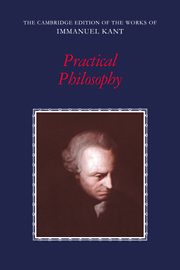Book contents
- Frontmatter
- Contents
- General editors' preface
- Preface
- General introduction
- Review of Schulz's Attempt at an introduction to a doctrine of morals for all human beings regardless of different religions (1783)
- An answer to the question: What is enlightenment? (1784)
- On the wrongfulness of unauthorized publication of books (1785)
- Groundwork of The metaphysics of morals (1785)
- Review of Gottlieb Hufeland's Essay on the principle of natural right (1786) [translated and edited by Allen Wood]
- Kraus's review of Ulrich's Eleutheriology (1788)
- Critique of practical reason (1788)
- On the common saying: That may be correct in theory, but it is of no use in practice (1793)
- Toward perpetual peace (1795)
- The metaphysics of morals (1797)
- On a supposed right to lie from philanthropy (1797)
- On turning out books (1798) [translated and edited by Allen Wood]
- Editorial notes
- Glossary
- Index of names
- Index of subjects
On the wrongfulness of unauthorized publication of books (1785)
Published online by Cambridge University Press: 05 June 2012
- Frontmatter
- Contents
- General editors' preface
- Preface
- General introduction
- Review of Schulz's Attempt at an introduction to a doctrine of morals for all human beings regardless of different religions (1783)
- An answer to the question: What is enlightenment? (1784)
- On the wrongfulness of unauthorized publication of books (1785)
- Groundwork of The metaphysics of morals (1785)
- Review of Gottlieb Hufeland's Essay on the principle of natural right (1786) [translated and edited by Allen Wood]
- Kraus's review of Ulrich's Eleutheriology (1788)
- Critique of practical reason (1788)
- On the common saying: That may be correct in theory, but it is of no use in practice (1793)
- Toward perpetual peace (1795)
- The metaphysics of morals (1797)
- On a supposed right to lie from philanthropy (1797)
- On turning out books (1798) [translated and edited by Allen Wood]
- Editorial notes
- Glossary
- Index of names
- Index of subjects
Summary
Introduction
Kant's essay “On the Wrongfulness of Unauthorized Publication of Books” was first published in the Berlinische Monatsschrift in May 1785. On June 5 the editor of the journal, Johann Erich Biester, wrote to Kant about other matters and, in passing, expressed the hope that Kant would soon use “our mouth, in order to deliver your speech to the public by means of us.” Apart from the fact that, as the opening paragraph of this essay indicates, the topic of literary piracy was being discussed at the time, nothing definite is known about the occasion for this essay. Perhaps Kant's discussion of the subject twelve years later, in Part I of The Metaphysics of Morals, was an attempt to substantiate his assertion that the case he makes is “undoubtedly to be found in the elementary concepts of natural right” and to provide “the requisite eloquence of Roman legal scholarship,” insofar as this could be done within the limits of metaphysical first principles.
Kant himself was eventually involved in legal difficulties because of the cavalier way in which questions of copyright were treated. Had Kant given J. H. Tieftrunk permission to include, in his proposed collection of Kant's minor writings, all three parts of Der Streit der Fakultäten? Tieftrunk assumed that he had and published all three, though not in serial order. The authorized publisher of the book, C. F. Nicolovius, brought a lawsuit against Tieftrunk, who cited as his evidence Kant's failure to object when proofs for the collection were sent to him.
- Type
- Chapter
- Information
- Practical Philosophy , pp. 23 - 36Publisher: Cambridge University PressPrint publication year: 1996
- 5
- Cited by

